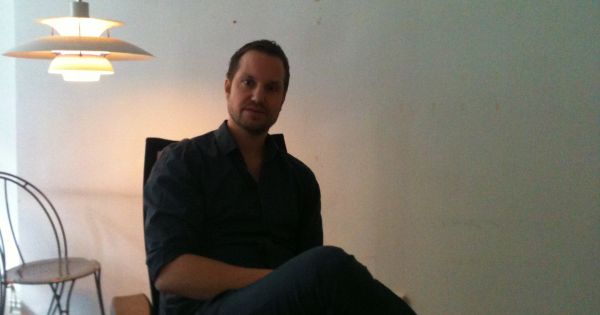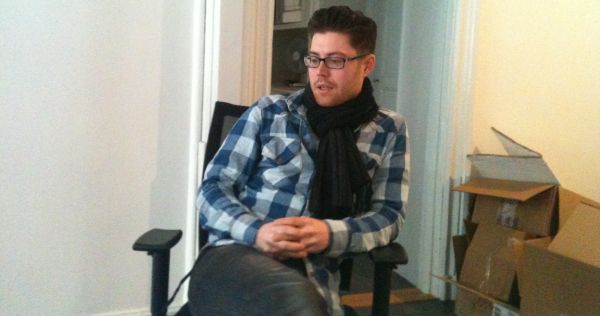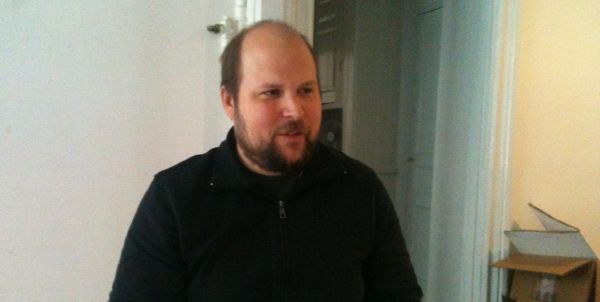A Day In The Life Of Minecraft Creator Mojang
With exclusive access to Minecraft creators Mojang, I spent a day with Markus 'Notch' Persson and his team in their Stockholm offices, from the first meeting of the morning to the Friday afternoon's booze and gaming relaxation. With kebab in between. Notch talks to us about how he came to be in the position he's now in, his intentions for Minecraft and Scrolls, and the philosophy behind his game development. I also speak to his colleagues Jakob Porser and Carl Manneh, find out how the team deals with player feedback, their passion for transparency, and Notch's plans for games after he's completed Minecraft.
“Sweden is a nation of heavily regulated drunks,” Minecraft creator Markus 'Notch' Persson informs me as we walk through a local off-license. A freezing, snowy town seems to be disguising the drunken nature of its inhabitants well. We gather beer because it's Friday, which means it's gaming afternoon at Mojang, the six month-old game developer located on one of Stockholm's many islands.
Mojang has enough money to be comfortable. Not that you'd quite know it to look at their current offices. Its unassuming entrance belies the presiding tone of relaxed yet focused dedication. A scrap of file paper is taped to the inside of the window by the front door, with "MojangAB" hastily scrawled in green pen. It's accompanied by a graffiti scrawl on the adjacent wall, seemingly declaring "ron". (But in a country that says "bra" for "good", I quickly learned to make no assumptions.) Still in the process of being refurbished – or indeed furbished – their labyrinthine floor of an apartment building looks as though they're squatting there. “This is the conference room,” says Daniel Kaplan, Mojang’s business developer, showing me into an empty room bereft even of carpets and curtains. There’s a single cardboard box in one corner. “It still needs some work.”
But it's home to one of the biggest success stories in indie gaming for years. Currently employing nine staff, things have moved quickly for the fledgling company, since the days when Persson was coding Minecraft from his oversized desk at home.
“When I went full time on Minecraft, last year in June, I was spending all my time at home,” explains the man behind the phenomenon, Markus Persson. “That was really awesome... for two months. Then slowly I started getting weirder. It felt just wrong.”
This was to be a time when everything started changing for Persson. Minecraft was bigger than anyone could have expected, the creator included. He was the talk of the gaming scene, people staring transfixed at the counter on his website showing how many copies he’d sold. And then he found himself invited to visit Valve. They wanted to offer him a job, but Persson turned it down. “I don't want to work for Valve,” he explained as we walked back to the office. “I want to be Valve.”
When he returned from Seattle he said to two good friends, Carl Manneh and Jakob Porser, that he wanted to start a company. Porser had worked with Persson before at King.com, then later got to know Manneh. It was clear the two coders were going to need someone to manage them, and Manneh was the obvious choice.
Mojang was created more so they could develop their recently announced second project, Scrolls, rather than Minecraft. Minecraft was doing just fine, bringing in enough money to keep a company easily afloat. But Scrolls had been on their minds for years, and this was a chance to finally bring it into being.
“I had all this money, and a fairly valuable IP, and it was my sole proprietorship. Which was pretty bad,” says Persson. “Starting a company meant we could make sure everything was legal.” A company he intends to keep small. “The original plan was to be seven people, but I think we're going to end up being about twelve. If there's other things we need to do, like have a big support department, then I'll try outsourcing that.”
It must be quite daunting to expand so quickly, I suggest. “Not really,” says Carl Manneh, “when you have loads and loads of revenue. It’s not like we’re running on a tight budget. We have pretty much all the freedom in the world. We could hire even more aggressively if we wanted to, but we want to keep the team small.
At Mojang, the work day begins with the team gathering around their large pinboard, on which all their current tasks are tacked. Everyone takes it in turn to say what they did yesterday, and what they're planning to do today. Holding the meeting in English so I could join in, there was talk of peculiar coding corrections, intentions for constructions they would be making in Minecraft that afternoon, and quite how late the currently absent artist, Markus "Jnkboy" Toivonen, had worked the previous night. (They don’t work with deadlines, I’m told, apart from when they do.)
The meeting is a time when they can question each other about ideas, and seemingly be surprised by the initiatives their colleagues have completed. And then they get on with it, unhindered.
And to do this, they say, it's important to keep the size of the company small. “If your company gets too big then you get the mean of every opinion. The middle of it,” says Persson, looking around the room. “If you have 1,000 people it's going to be very bland.” You can't gather 1,000 people around a pinboard.
Jakob adds, “We want to work in a tight team where everybody knows each other. I worked at companies where we’d start out being fifteen people or so and it’s really tight. But over the course of a couple of years you’re one hundred people, and you don’t know each other any more.”
It's part of realising Persson's philosophy for the company.
“What I want to do is work in a company that develops new IP. We shouldn't focus on what other people have done. When a gamer plays a game they wonder, ‘why can't I pick up that rock?' What we should do is make those kind of games. All the tiny things that almost unconsciously annoy us in games, we should try to avoid doing those things.” Let us open all the doors. “Yes, if it's a door, it should be openable.”
The idiosyncrasies of gaming seem to fascinate the team. I mention how it makes me laugh that sometimes a killed pig doesn’t drop a pork steak, joking that it’s like in World Of Warcraft when a wolf apparently dies without keeping any of its fur. Persson laughs, and describes it as one of his expectations in games. “Random loot is something you can get really obsessed about. It’s annoying when you don’t get something for a long time, but it’s very annoying when you get lots of it.”
The morning passes with people focused at their desks, occasionally interrupted by calls to gather to see the latest YouTube video of something to do with Minecraft. “One of the coolest things about Minecraft is how often we all end up gathered around a monitor to watch something someone has made,” says Carl Manneh. The atmosphere in the office is light, but it’s clear these are focused people. However, Friday is a more relaxed day, with the afternoons dedicated to gaming – a tradition that goes back to previous companies they’ve worked for.
Another tradition comes first, however: kebabs for lunch. We headed to a nearby favourite, and settled down with ludicrously piled plates.
When meeting Persson, it's impossible not to tell him your Minecraft stories. He's enthusiastic to hear them, and has anecdotes of his own. We exchange techniques for surviving drops from the top of giant dirt marker towers near our bases, and compare who is the more finicky about clearing out caves.
One of the joys of Minecraft is quite how adaptable it is to play. Some see it as an exploration game. Others take on the combat. There are those who must dig, and dig, obsessively hunting out every scrap of ore. And others still construct, building elaborate projects. Persson's an explorer.
“I like to dig out caves. I think it's a completionist thing. I see a hole through to another cave and I have to continue on, clear every passage.” He's able to resist digging out dirt and gravel, and as such hasn't discovered the bug that lets you dig more quickly if you aim the shovel at the wrong angle. Don't ever fix that bug, I beg him. “Bugs that are fun are fine,” he reassures me. “I don't need to fix bugs that are fun.” And there's much to the game that even he hasn't yet mastered. There's a corner jump that Persson's seen people do on YouTube. It involves jumping from one block to another around a corner, and he can't do it. “But it's MY game!” he exclaims.
At 31 Persson is already a millionaire. But it really doesn’t seem to have changed him. His delight at the financial success is that it means he’ll be able to keep making games for as long as he wants to. “I can keep doing this for the rest of my life,” he says, with evident enthusiasm. The change is very new, and is still sinking in. “It wasn’t really overnight. It was half a year. It was more, ‘I have a fairly large income, but I don’t know when it’s going to end.’” As for the upsides of having enough cash, he says, “I’m slowly starting to get used to flying business class, things like that. But it wasn’t like, ‘Oh shit, I’m rich! I’m going to buy a horse.’ I have basically the same life as before.”
It’s a life that had long contained an interest in gaming, starting when he was a child, programming at eight years old on a Commodore 128. He would enter the codes printed in magazines. “I figured out if you did something wrong, it did something else.” It was an example of his being a tinkerer. “I had this bedside clock, which I pulled apart and screwed back together. I did the same thing with the code.”
Continuing to code on Atari, and then later getting a job with a middle ware company “that never sold anything”, he eventually came to notoriety working with Rolf Jansson on Wurm Online. It’s a game he talks about very fondly. And one that got him used to working in reaction to an audience.
Because people love Minecraft so much there’s always a source of outrage whenever anything changes. I ask Persson how he filters this, how he stops himself from focusing on the negativity. “I’ve started taking a mathematical approach,” he tells me. “I’ve started counting. Okay, there’s eight positives, and one negative. But it’s still difficult. And of course, when there’s a lot of negative comments then it means we did something wrong.”
I ask if they’ve gone back on anything in response to this? Markus tells me about the Creepers, how they used to explode every time they died. “People said it wasn’t fun.” And those seem to be the words to get to the very centre of Mojang’s development, to make them take notice. “That led to the decision to have everything that effects the game negatively always happen near the player. So it’s your fault, you saw it happen, you know why there’s a big hole in your house. It’s not like you get back and find it’s all blown up. That would be no fun.” It was the feedback about the Creepers that led to that whole way of thinking, that influenced the rest of their process.
As we walked back to the offices, sliding on the inch-thick ice covering every pavement in the town, I pointed out that since I’d arrived it had been snowing heavily enough to close English airports, but from a completely clear blue sky. I expected to be told this is quite normal for Sweden, but the others gasped in surprise too. This is a country truly dedicated to snowing. It surprises me that it took so long for snow to be added to Minecraft.
Back in the office, something I was told earlier became apparent. The gaming on Friday afternoons is not a feature of an office of slackers, looking to live in some sort of 1990s MTV imagined version of what a gaming start-up would look like. (I didn’t see a single beanbag.) It’s because everyone works so hard that leisure time has to be forced on them. Despite the allotted gaming time having started, everyone was still at their machines finishing the projects they’d pledged to work on at that morning’s meeting. Beers sat beside them on the desks, but convincing themselves to stop working seemed to take more than a bit of alcohol.
With two games on the go already, they’re a busy group. Although with Minecraft due to be finished before the end of the year, it leaves room for that third game Persson had mentioned earlier. I ask him whether he’s willing to talk about it yet, expecting the usual polite declination. Mojang is not your usual developer.
“I have many games in mind,” replies Persson. Does he know which will come next? “It keeps going back and forth. I’m really annoyed with how there are no space trading simulators at the moment. And the ones there have been always kind of miss the point. They’re fun, but even Elite 2 which was a great game, wasn’t really what I wanted. I really want to make that, but that’s going to be lots of work, and be extremely nerdy, and probably won’t sell very well. But hopefully I can convince other people here that they want to do it.”
Well, there’s our headline then: “Mojang’s next game is a space trading simulator.” But he’s not done.
“And then I have this weird town simulation thing, which is basically a single character Sims. You’re just one character in the town, just living.”
I find myself wanting to brainstorm the idea with him. Yes! I want a game like that too. Persson is a man who's constantly having ideas. Minecraft's development process matches its author – new thoughts manifesting all the time, getting added in on the fly. As you chat you feel like you're part of the development process, Persson considering thoughts and calculating whether they'd improve his projects.
Does he plan to make it real, or fantasy? “The setting would be a real city, but it would have the same approach as Minecraft. If it’s fun, it gets added. So it wouldn’t be a super-realistic city simulator. It would be my take on what real life is.”
We talk about The Sims, about the frantic nature of work it puts on you. How so few life simulating games have any concept of calm. “I like the idea of calm,” Persson comments. “I like focusing on what’s actually fun. Sims, well it is kind of fun when you get used to it, lots of it is doing the same thing over and over a lot. I want something which is… something more playful.”
The headline I’m writing in my head starts to get a bit more convoluted. “Notch’s next game is either a space trading sim, or a real-world calm city, experiencer.” But it gets more complicated. I ask him if there’s any more ideas in his head.
“Er… yeah. I shouldn’t probably say this because people might steal it, but what the hell. It’s like a football manager, but it’s for fantasy heroes. If you have a troll and a goblin in the same team, the troll might eat the goblin. Stuff like that.”
Again, yes. The idea came about because Markus wants to enjoy football management games, but doesn’t like football. “But I do like people going into dungeons…” He fades out, and then brings up an old game he loved, Darklands. “It was a take on Germany in the Middle Ages. When you start the game it’s random whether or not dragons exist. So you don’t know throughout the game – people keep referencing dragons, but they might or might not exist. It was how people in that time thought about the world.” Quite how this fits into a football manager style game remains a mystery.
“One tiny detail I want to do for it,” Persson continues, apparently back to the core idea, “is something like the Diablo inventory management.” Referring to the loved or loathed inventory Tetris, he emphasises that it itself was “a thing. It was a game within the game. So we could definitely have that kind of inventory for each character in your party.” And then once again the development cogs are whirring faster than I can keep up with. “Oh, but I need more healing potions! And he could carry it, but then he can’t heal that guy, because they’re probably going to be far from each other, because he’s an archer, and he’s like…” Markus and I both break into laughter. “I think there are more ideas,” he adds. “But I can’t remember them right now.”
The transparency with which they work has obviously gathered a lot of attention. Their ideas, as has just been so comprehensively demonstrated, are shared openly. It must have both helped and hindered them. “It helps,” says Persson, “because it’s part of how I wanted to develop games, inspired by 2D Boy and TaleWorlds. I am very verbose, and I’m used to talking about things. And it gets us lots of good PR, because it means people want us to succeed.”
However he’s also aware that it does mean other people can take his ideas. “I don’t mind clones,” he adds, expressing his dislike of people being prevented from making mimicking games. “You own the concept of blocks falling?! I’m really against the idea of software patents.” But if he gives all his ideas away, he says, other people could work on it before he’s able. “So it’s a strategy to not do that.” He laughs, and continues, “But now I’ve told you all the ideas anyway.”
There’s a strong tone of the desire for ideas to be free within the company. While disappointed when people use their trademarks or art work, Persson fully encourages people to steal the ideas behind Minecraft. There’s plans to release parts of the source code in the future, to encourage people to modify the game. The save and load code, for instance, will likely be released to allow others to make their own level generators. Modding support will also contain a lot of source code. But not the core, or the renderer, at this stage. But later on, once the game is no longer being developed, he can see the whole game code being released.
Something occurred to me during my time with Mojang that I’d not thought about before. Minecraft taps into something on a really primal level – it’s about the very most basic human needs. It addresses the basics of Maslow's hierarchy of needs, focusing on the need for homeostasis and shelter ahead of the subjects of most other games, that appear higher on Maslow's pyramid. Friendship, family, respect, morality, problem solving and so on are the subjects on which most games will centre their narratives, even if they’re just about shooting soldiers in the face. But Minecraft gets at what lies underneath. Persson sees it so much more clearly. “If you base your game on reality, you don’t have to design – you can just copy.”
With his town simulator, and of course Wurm Online before Minecraft, the theme is consistent in his games. “I think it comes from the frustration with other games,” he explains. “Why can’t I do this? Why can’t I open this door?” It’s unfamiliar from how I would expect it to work.” But this seems to be something that’s been the case for twenty years now. “And they get worse,” Persson adds. “I figure it ties into how linear a game is. If a game is too linear, if you try to explore you just get frustrated.” We talk about a shared desire in driving games to drive the wrong way around the track, or off toward the crowd.
Which captures so much of the overriding philosophy of Mojang. As much as Minecraft is procedurally generated, so is their development. This open, inspired method of constant iterations seems to constantly surprising themselves. Persson explains that mob villages will likely be an expansion for Minecraft after it’s finished. But then if he realises how to do it before, then it’ll get in there.
It’s risky, exciting. But they’re also in a position of security with the remarkable cash at their disposal, new offices they’re in the process of making their own, and the opportunities to make the games they’ve always wanted to play. And Persson recognises that need for safety, both in and out of the game.
“The sense of security is really important. That’s why torches are in the game. It’s so you can feel safe.”


















